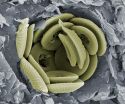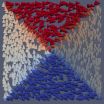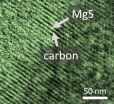Scientists develop drug to reduce side-effects of 'binge drinking'
2014-12-01
(Press-News.org) A DRUG that could reduce the harmful side-effects of 'binge drinking', especially by teenagers, has been successfully developed and tested by a team of European scientists, including the University of Huddersfield's Professor Mike Page and Dr Karl Hemming. There is also the potential for new ways to treat Alzheimer's and other neurological diseases that damage the brain.
The key to the breakthrough is a compound developed by Professor Page and colleagues at the University of Huddersfield which is named ethane-beta-sultam. This is a taurine 'pro-drug' - an effective form of medication that easily enters the blood stream before it is processed by the body into its active form. It is difficult for drugs to get into the brain because of the 'blood-brain barrier', the natural defence mechanism that protects the brain, but which also presents a formidable obstacle to the medicinal treatment of neurological illness.
Scientists based at universities in Louvain in Belgium, Florence in Italy and Huddersfield and London in the UK, have discovered that when ethane-beta-sultam is administered to rats on a 'binge drinking' regime, it reduces the brain cell loss and inflammation that normally result from bouts of heavy binge drinking, leading to symptoms such as decreased memory. These effects can cause long-term damage, particularly to teenagers, whose brains are still in the process of development.
New compound ethane-beta-sultam
The findings of the 11-strong research team - which received EU funding for the project - are revealed in a new article published by the Journal of Alcoholism and Drug Dependence. The authors include Professor Page and his University of Huddersfield colleagues Dr Hemming - who is Reader in Organic Chemistry and Course Leader for Chemical Sciences - and a PhD research student Arnaud Pitard.
It has been shown how brain functions are impaired by alcohol and this is accompanied by inflammation and loss of cells in the brain. However, the effects were reduced or returned to normal in the rats that also received the new compound ethane-beta-sultam.
"One of things that alcohol does is to destroy some of the brain cells which are important for navigation and orientation," said Professor Page. "But a combination of alcohol and our compound could overcome this damage."
He explained that the brain protects itself using 'glial cells', which are increased when exposed to alcohol in a binge-drinking regime. "But a combination of our ethane-beta-sultam given at the same time as the alcohol decreased these levels of glial cells."
Professor Page said that the collaboration leading to the latest article had been in place for about ten years. The project continues and could include research to find a compound that performed even better than ethane-beta-sultam. In the longer term, there is a possibility that such compounds could help with the treatment of diseases such as Alzheimer's and dementia which also result from a loss of brain activity.
Many issues surround the prospect of a drug that masks the effects of binge drinking. "But if you accept that alcohol abuse is going to continue, then it might be sensible for society to try and treat it in some way," says Professor Page.
INFORMATION:
[Attachments] See images for this press release:

ELSE PRESS RELEASES FROM THIS DATE:
2014-12-01
Knowledge of the three-dimensional structures of proteins is essential for understanding biological processes.
Structures help to explain molecular and biochemical functions, visualize details of macromolecular interactions, facilitate understanding of underlying biochemical mechanisms and define biological concepts.
The human genome and follow-up sequencing projects have revolutionized biology and medicine; structural genomic programmes have developed and applied structure-determination pipelines to a wide range of protein targets, facilitating the visualization of ...
2014-12-01
A study of ancient marine algae, led by the University of Southampton, has found that climate change affected their growth and skeleton structure, which has potential significance for today's equivalent microscopic organisms that play an important role in the world's oceans.
Coccolithophores, a type of marine algae, are prolific in the ocean today and have been for millions of years. These single-celled plankton produce calcite skeletons that are preserved in seafloor sediments after death. Although coccolithophores are microscopic, their abundance makes them key contributors ...
2014-12-01
"A quantum computer may be thought of as a 'simulator of overall Nature," explains Fabio Franchini, a researcher at the International School for Advanced Studies (SISSA) of Trieste, "in other words, it's a machine capable of simulating Nature as a quantum system, something that classical computers cannot do". Quantum computers are machines that carry out operations by exploiting the phenomena of quantum mechanics, and they are capable of performing different functions from those of current computers. This science is still very young and the systems produced to date are ...
2014-12-01
Subliminal visual cues are words, pictures or symbols which are unidentifiable in someone's conscious.
Conducted by Professor Samuele Marcora in collaboration with colleagues at Bangor University, the research discovered that athletes undergoing endurance exercise who were presented with positive subliminal cues, such as action-related words, including 'go' and 'energy', or were shown happy faces, were able to exercise significantly longer compared to those who were shown sad faces or inaction words.
The words and faces appeared on a digital screen - placed in front ...
2014-12-01
Researchers at DESY have used high-speed photography to film one of the candidates for the magnetic data storage devices of the future in action. The film was taken using an X-ray microscope and shows magnetic vortices being formed in ultrafast memory cells. Their work, which has been reported by the scientists surrounding Dr. Philipp Wessels of the University of Hamburg in the journal Physical Review B, provides a better understanding of the dynamics of magnetic storage materials. Magnetic memory cells are found in every computer hard drive.
"Our images allow us to observe ...
2014-12-01
Group mindfulness treatment is as effective as individual cognitive behavioural therapy (CBT) in patients with depression and anxiety, according to a new study from Lund University in Sweden and Region Skåne. This is the first randomised study to compare group mindfulness treatment and individual cognitive behavioural therapy in patients with depression and anxiety in primary health care.
The researchers, led by Professor Jan Sundquist, ran the study at 16 primary health care centres in Skåne, a county in southern Sweden. They trained two mindfulness instructors, ...
2014-12-01
27 November 2014 - Anopheles mosquitoes are responsible for transmitting human malaria parasites that cause an estimated 200 million cases and more than 600 thousand deaths each year. However, of the almost 500 different Anopheles species, only a few dozen can carry the parasite and only a handful of species are responsible for the vast majority of transmissions. To investigate the genetic differences between the deadly parasite-transmitting species and their harmless (but still annoying) cousins, an international team of scientists, including researchers from the University ...
2014-12-01
This news release is available in German.
The Helmholtz Institute Ulm (HIU) established by Karlsruhe Institute of Technology (KIT) is pushing research relating to batteries of the next and next-but-one generations: A research team has now developed an electrolyte that may be used for the construction of magnesium-sulfur battery cells. With magnesium, higher storage densities could be achieved than with lithium. Moreover, magnesium is abundant in nature, it is non-toxic, and does not degrade in air. The new electrolyte is now presented in the journal "Advanced Energy ...
2014-12-01
TORONTO, December 1, 2014 - For the first time, a team of astronomers - including York University Professor Ray Jayawardhana - have measured the passing of a super-Earth in front of a bright, nearby Sun-like star using a ground-based telescope. The transit of the exoplanet 55 Cancri e is the shallowest detected from the ground yet, and the success bodes well for characterizing the many small planets that upcoming space missions are expected to discover in the next few years.
The international research team used the 2.5-meter Nordic Optical Telescope on the island of ...
2014-12-01
Women with a mental illness (including depression, anxiety and serious mental illnesses) are less likely to be screened for breast cancer, according to new research published in the BJPsych (online first).
The research was led by Dr Alex J Mitchell, consultant psychiatrist in the Department of Cancer Studies, University of Leicester.
Studies have previously shown there is a higher mortality rate due to cancer in people with mental illness, perhaps because of high rates of risk factors such as smoking. In addition, it appears cancer is often detected later in those with ...
LAST 30 PRESS RELEASES:
[Press-News.org] Scientists develop drug to reduce side-effects of 'binge drinking'





